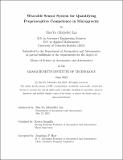Wearable Sensor System for Quantifying Proprioceptive Competence in Microgravity
Author(s)
Lin, Shu-Yu (Michelle)
DownloadThesis PDF (7.687Mb)
Advisor
Arquilla, Katya
Terms of use
Metadata
Show full item recordAbstract
Microgravity poses a significant challenge for our neurovestibular and proprioceptive systems. Past spaceflight and parabolic research have shown degraded movement control upon microgravity exposure and adaptation of performance with time. However, most research does not address the functional, dynamic, whole-body movements we expect in spaceflight. In particular, as commercial microgravity experiences become ubiquitous, maladapted proprioceptive systems in novice flyers pose risks to themselves, other crew members, and expensive spacecraft equipment. We propose a framework to assess proprioceptive competence (introduced and defined in this thesis) through the metric of fluidity, a biomechanical property often used in medical rehabilitation and functional gait assessment. We designed, built, and pilot tested a wearable sensor system capable of inertial motion capture in the parabolic flight environment. Through comparing whole-body joint fluidity in translation movements done in 1-g and microgravity, we found evidence suggesting an increased fluidity upon entry into microgravity and increased fluidity throughout microgravity exposure.
Date issued
2023-06Department
Massachusetts Institute of Technology. Department of Aeronautics and AstronauticsPublisher
Massachusetts Institute of Technology